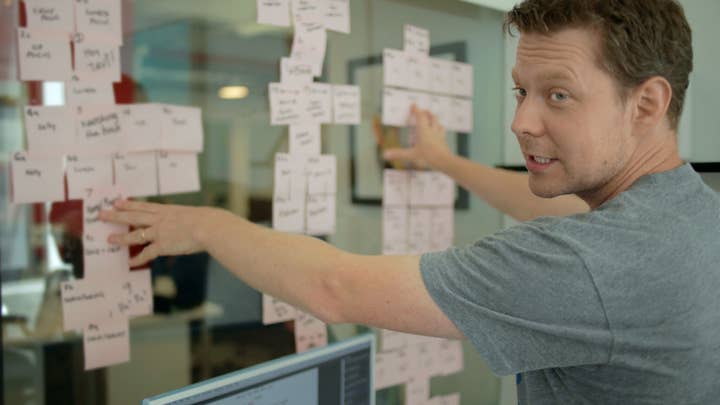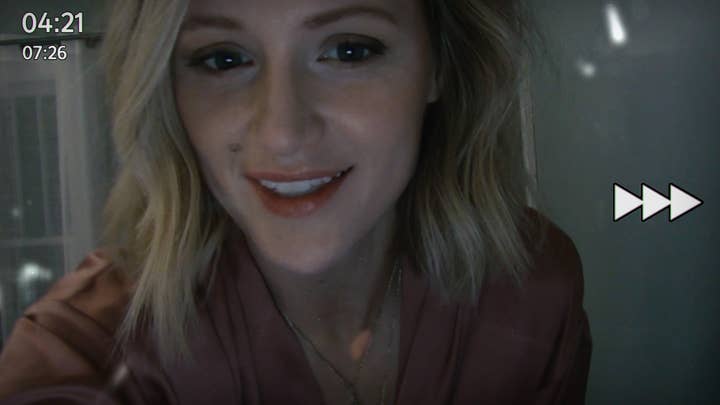Sam Barlow on crafting stories players tell themselves
The acclaimed developer discusses his work on Telling Lies and Her Story, and how he hopes to advance interactive fiction
Following the success of Her Story, Sam Barlow was inundated with offers from TV and film companies.
These firms saw the promise of interactive fiction and wanted to apply their own murder mystery or crime procedural IP to Barlow's proprietary tech. But the developer didn't want to simply clone his award-winning hit -- that would be missing the point.
When he looked at other similar projects across both games and TV, even as recently as Netflix's Black Mirror: Bandersnatch at the end of last year, most seem to ape the traditional choose-your-own-adventure structure. What Barlow was attempting to prove with Her Story is that the real potential for interactive fiction is not in steering stories but in discovering them for yourself.
It's a concept he builds on with last week's Telling Lies, a game in which players search through videos recorded from private conversations between four characters. These clips explore the impact of a shared event on each person but players can dig deeper, latching on to certain hints and threads in their words, to discover deeper connections between them.
"The cool thing with [my games] is the bigger, more exciting moments are entirely in your head," he tells GamesIndustry.biz. "You're not being told they are exciting, you're not necessarily being told what the thing you've figured out is. You're just putting two and two together, going 'Hang on a minute' and searching against something to confirm your suspicions.
"I think that's one of the things that made Her Story feel novelistic. The progression was something that was in your mind."
Telling Lies adds another layer of complexity in that you only see characters when they're on camera. If it doesn't make sense that someone would be on Skype at any given moment, that can't be included. It's a stark contrast to how most stories are told.
"The cool thing with [my games] is the bigger, more exciting moments are entirely in your head. You're not told they are exciting"
"The player is only seeing these characters' lives when they are talking to each other online, you're outlining a story around the negative space," says Barlow. "You're not necessarily seeing these big plot points, you're just seeing the effect of them."
Anyone who has played Her Story will remember the big revelation, but might not remember exactly how they arrived at it, so subtly are the seeds sown. It feels like a prime example of how video games can tell stories in a way no other medium can, but Barlow suggests it speaks to the way we consume and interpret them in all other media.
"We're so literate in storytelling -- not just as a culture, but also as human beings -- that if you give people these pieces, they will naturally turn it into something that looks like a story themselves," he says. "So you can ask a lot of the audience by giving them bits and pieces, leaving these big gaps and they will naturally fill them.
"Watching a suspense movie is very much about the director putting bits of information in your mind so you build up an idea and you're predicting what happens next -- and then it might not happen. There's this back and forth between the audience and the person telling the story. The beauty of something that's interactive is that you can have a bit more feedback there."
It makes both Her Story and Telling Lies this strange blend of a unique and shared experience; shared, in that everyone reaches the same (or similar) conclusions, but they all do so in a way unique to them. In tests for Telling Lies, 20 people would all make different connections at different times, but they all started from the same point.

Barlow offers the example of TV shows, which now exist beyond their usual airtime slot. Each new episode will prompt Reddit discussions, have people live-tweeting their reactions, and see fans reading recaps the next day to check they didn't miss anything. The developer believe Westworld, for example, is clearly written knowing these discussions are happening, and this is something he certainly had in mind for Telling Lies.
"This is very much a story for you to tear to pieces, we want you to scrutinise everything," he says. "We have this beautiful mechanic where you can scrub around a video in a very analogue hands-on way. We're asking you to watch and rewatch. We're asking you to notice particular lines or facial expressions, to scrutinise what's happening in the background.
"This is very much a story for you to tear to pieces. We're asking you to notice particular lines or facial expressions, to scrutinise everything"
"I definitely felt like this is an angle that's not being explored. The choose-your-own-adventure thing is the obvious route, but this kind of stuff feels as valid and potentially richer a seam for us to mine."
And there's plenty to scrutinise. Telling Lies is on a far grander scale than Her Story. Its budget, Barlow says, is 30 times bigger, it has 10 hours of live action footage compared to his previous game's two, and the core cast has expanded from one to four. The developer had originally envisaged this as a game that, like Her Story, could be played in a single sitting or a couple of evenings, but once the filming was complete, he realised he had created something far bigger.
Even the final script was akin to that of a movie, but while those are usually trimmed for extraneous stuff, Telling Lies was much harder to edit. Things that would be cut to tighten a film's screenplay would actually open more areas of enquiry, so leaving them in maximise player's agency to explore the story.
It was equally important to ensure that no single scene gave a definitive resolution, or that no single question could essentially finish the game when answered, rendering all other routes of enquiry dead. For Barlow, this means layering the story with more subtext and connections than the initial premise implies.
"In Her Story, people came in mostly because of the hook of having to solve a murder," he says. "Reasonably quickly people could piece together the nuts and bolts of who killed who and why, but that led to more questions, more interesting questions.
"In Telling Lies, you have four characters that have full stories, that are all connected by what you might call the A plot, but once you piece that together, the questions that come up are far more interesting, and you might just want to hang out with these characters more and see more of their lives."

The developer has in the past joked that this is an open-world game, even comparing it to Zelda: Breath of the Wild, but it's easy to see what it means. With Nintendo's epic, players always know where to head for the next big story event but they do so at their own pace, Barlow explains. Along the way there are subtle hints -- as opposed to the clutter of markers and glowing 'go this way' lines found in other open-world titles -- at new potential discoveries, paths that might lead to secrets. Again, players have the agency to decide what to prioritise.
"Similarly, in Telling Lies, there is so much content and we've put effort into making sure it's all interesting, rich, colourful and varied, that you can just go off into tangents on particular things and it will be satisfying, and then you can come back to your main thread you were chasing down."
Of course, all stories must end. But with Barlow's works, that end isn't as definitive as those in other titles. It's about "giving people permission to walk away," he says. It's entirely possible to trigger the credits having only dug into one or two characters' stories in Telling Lies, but the knowledge that there's more to discover leaves it up to players whether they are truly finished.
"Every test we've run, people who have got to the credits come away saying, 'That was cool, I got a sense of what the story was, I felt like I got to a point, but I'm aware there are whole swathes of stuff I haven't seen,'" says Barlow.
"That's exciting to me, the idea that you can finish something and feel satisfied but know you can come back to it and dig up fresh stuff or take a different tack and focus on a different character."
He continues: "There are bigger questions [in Her Story] that are not explicitly resolved, so people can come away with different takes. When we have people test Telling Lies, we let them play for three or four hours, then we ask them to tell us the story themselves, and then talk with each other about it, and there are some questions that are around intent and honesty -- given the game's title -- that people would debate and argue about."
Much like a Reddit forum after the latest episode of Westworld.


